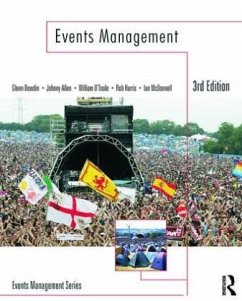Events Management is the must-have introductory text providing a complete A-Z of the principles and practices of planning, managing and staging events. The book:
introduces the concepts of event planning and managementpresents the study of events management within an academic environmentdiscusses the key components for staging an event, covering the whole process from creation to evaluationexamines the events industry within its broader business context, covering impacts and event tourismprovides an effective guide for producers of eventscontains learning objectives and review questions to consolidate learning.
Each chapter features a real-life case study to illustrate key concepts and place theory in a practical context, as well as preparing students to tackle any challenges they may face in managing events. Examples include the Beijing Olympic Games, Google Zeitgeist Conference, International Confex, Edinburgh International Festival, Ideal HomeShow and Glastonbury Festival. Carefully constructed to maximise learning, the text provides the reader with:
a systematic guide to organizing successful events, examining areas such as staging, logistics, marketing, human resource management, control and budgeting, risk management, impacts, evaluation and reportingfully revised and updated content including new chapters on sustainable development and events, perspectives on events, and expanded content on marketing, legal issues, risk and health and safety managementa companion website for lecturers and students which includes PowerPoint slides, extra case studies and multiple choice questions to aid both teaching and learning.
introduces the concepts of event planning and managementpresents the study of events management within an academic environmentdiscusses the key components for staging an event, covering the whole process from creation to evaluationexamines the events industry within its broader business context, covering impacts and event tourismprovides an effective guide for producers of eventscontains learning objectives and review questions to consolidate learning.
Each chapter features a real-life case study to illustrate key concepts and place theory in a practical context, as well as preparing students to tackle any challenges they may face in managing events. Examples include the Beijing Olympic Games, Google Zeitgeist Conference, International Confex, Edinburgh International Festival, Ideal HomeShow and Glastonbury Festival. Carefully constructed to maximise learning, the text provides the reader with:
a systematic guide to organizing successful events, examining areas such as staging, logistics, marketing, human resource management, control and budgeting, risk management, impacts, evaluation and reportingfully revised and updated content including new chapters on sustainable development and events, perspectives on events, and expanded content on marketing, legal issues, risk and health and safety managementa companion website for lecturers and students which includes PowerPoint slides, extra case studies and multiple choice questions to aid both teaching and learning.

